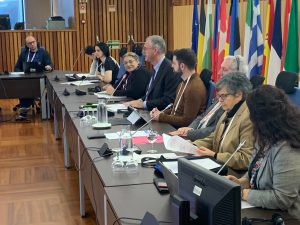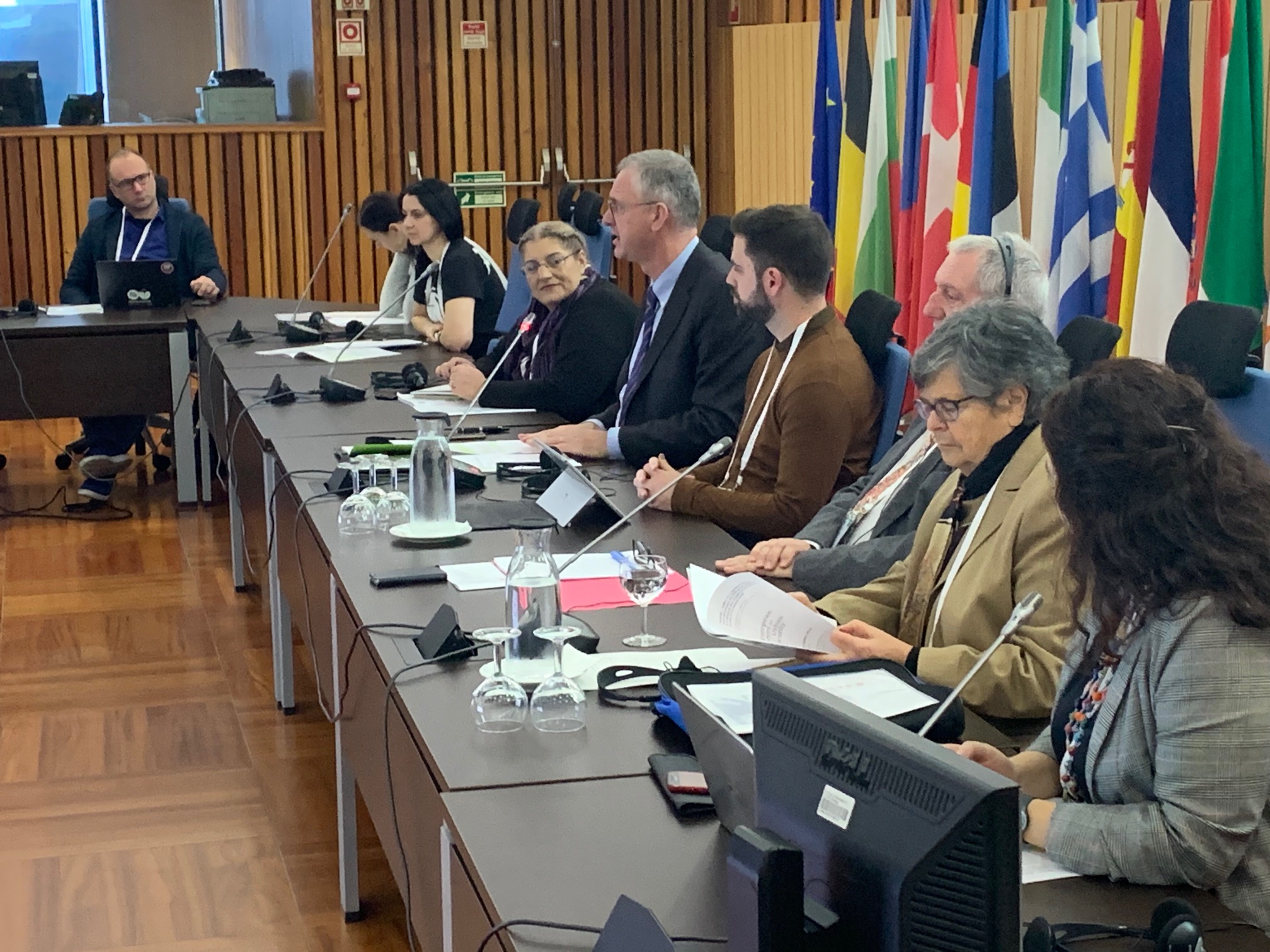 Lisbon, Portugal, December 2019 – The Efus-led SOLIDIFY European project on the implementation of Supervised Drug Consumption Facilities (SDCFs) in several European cities and the assessment of their local impact held its final conference in Lisbon, on 5-6 December.
Lisbon, Portugal, December 2019 – The Efus-led SOLIDIFY European project on the implementation of Supervised Drug Consumption Facilities (SDCFs) in several European cities and the assessment of their local impact held its final conference in Lisbon, on 5-6 December.
Co-organised with the European Monitoring Centre for Drugs and Drug Addiction, (EMCDDA) and the municipality of Lisbon, the event featured the presentation of the projects’ results as well as exchanges on local drug policies and the role of SDCFs in this endeavour.
>>>>>>>>>>>>>>>>>>>>>>>>>>>>>>>>>>>>>>>>
Words of welcome
> Willy Demeyer, Mayor of Liege, President of Efus
“Composing an effective and balanced drug policy that serves the needs of all citizens is a key challenge for European local authorities, which is at the heart of urban security policies. Integrated local harm reduction strategies have already brought promising results in several European countries in this regard.
The Solidify project has allowed our network to clearly define the potentials drug consumption rooms can have for a balanced, inclusive urban security strategy. We look forward to making the results of this work available to representatives from local authorities across Europe as well as other stakeholders. This participatory approach will allow discussions on how we can further support each other in strengthening such services and improving their public acceptability.”
> Alexis Goosdeel, Director of the European Monitoring Centre for Drug Addiction
“It is my great pleasure to co-host the final conference of the Solidify project here at the EMCDDA. This unique initiative — coordinated by the European Forum for Urban Security and funded by the European Commission — catalyses on-going local initiatives that create spaces for safer drug consumption, including in the City of Lisbon. We, as the EU drugs agency, are proud to open our doors for a much-needed exchange between science, practice and policy on this issue and to facilitate cooperation across different levels of government.”
> Fernando Medina, Mayor of Lisbon
“Lisbon has become a centre for drug policy exchange and has been clearly supportive of approaches based in pragmatism and rights. This year we became part of the group of cities that have implemented Supervised Injection Facilities and we join the efforts to keep on researching and understanding the role of these services as promoters of health and inclusion. For Lisbon it is a pleasure to host the final conference of Solidify, which will offer the occasion to take stock of our advances at the local and European level and design our network’s future initiatives. Welcome to Lisbon”
>>>>>>>>>>>>>>>>>>>>>>>>>>>>>>>>>>>>>>>>
> The importance of co-production in drug policies
Many speakers stressed how important it is to work within broad partnerships that represent all the relevant institutions and organisations (i.e. co-production), and the leading role local authorities can play in designing sustainable local drug policies that are widely accepted.
Carla Napolano, Efus Deputy Director, gave an overview of the work carried out locally during two years through SOLIDFY: audits, coordination meetings and field visits have demonstrated how important it is to build local, multisectoral partnerships around SDCFs.
Bernard Rivaillé, Mayor of Lormont (FR), President of the French Forum for Urban Security (FFSU) and member of Efus’ Executive Committee, said on behalf of Efus’ Executive Committee, of which he is a member: “Local and regional authorities are keen to develop local harm reduction strategy that are integrated. They also look at the role of Supervised Drug Consumption Facilities because they have yielded promising results in several European countries. Efus believes that repressive policies against people who use drugs are inappropriate because they fuel stigmatisation, which curbs their civic rights including the right to education, health and respect.”
For her part, Ruth Dreifuss, former President of the Swiss Confederation and Chair of the Global Commission on Drug Policy, said that “Our experience shows that cities are the level where reforms are needed and can be implemented, beyond the national level. Health professionals, law enforcement agencies and lawmakers are working on this together.”
Alexis Goosdeel, EMCDDA Director, said that he was “particularly pleased to see so many security and law enforcement practitioners at this conference. Multisectoral cooperation at the local level is what will make the difference in the future.”
> The future of European drug policies: exchanges and prospects
Representatives of local, regional and national authorities, civil society organisations, research centres, law enforcement agencies, and initiatives and networks of people who use drugs discussed a range of key questions relating to the future of European drug policies. These included: How to foster local multi-stakeholder partnerships?
How to improve cooperation between providers of health services, non-governmental organisations (NGOs) and the police? How to better assess the impact of harm reduction on public health and urban security? What role can drug checking play in reinforcing prevention and harm reduction at the local level?
These questions were discussed in round tables, group sessions and workshops as well as during 7 field visits on a number of harm reduction schemes put in place in Lisbon. These visits were organised by the Municipality of Lisbon in cooperation with the NGOs CRESCER, Medicos do Mundo, GAT and Ares do Pinhal, as well as the parish of Lumiar and the EMCDDA.
> Harm reduction and SDCFs key to effective local drug policies
The conference delegates agreed on the following principles:
- Drug policies must be pragmatic and seek to reduce the harms drug use causes to the health, social wellbeing and security of individuals, communities and society. They must be designed taking into account the needs on the ground, in each specific city or region.
- Supervised drug consumption facilities (SDCFs) have shown to be efficient tools to improve public health and security locally. They help prevent drug-related deaths, reduce risks that lead to the transmission of blood borne viruses such as HIV and Hepatitis C, and reduce public nuisance. They are an effective means to reach and stay in contact with highly marginalised populations, supporting their access to care and drug treatment. They do not encourage drug use.
- Local authorities have a key role to play in accompanying SDCFs and ensuring their effective management and acceptance in the local community. Together with civil society organisations, organisations and initiatives of people who use drugs, research institutions, governments and national and European agencies they can create synergies that strengthen their efforts and increase impact.
> Two new events in 2020
While the SOLIDIFY project will end in March 2020, the initiative and political momentum it has created will persist: Alexandre Feltz, Deputy Mayor of Strasbourg, wishes to host in his city a similar conference in April 2021. Furthermore, a workshop will be organised with the EMDCCA during Efus’ “Security, Democracy and Cities ” international conference in Nice (FR), in November 2020.
More information about SOLIDIFY
Contact at Efus: Moritz Konradi, Programme Manager (konradi@efus.eu)




